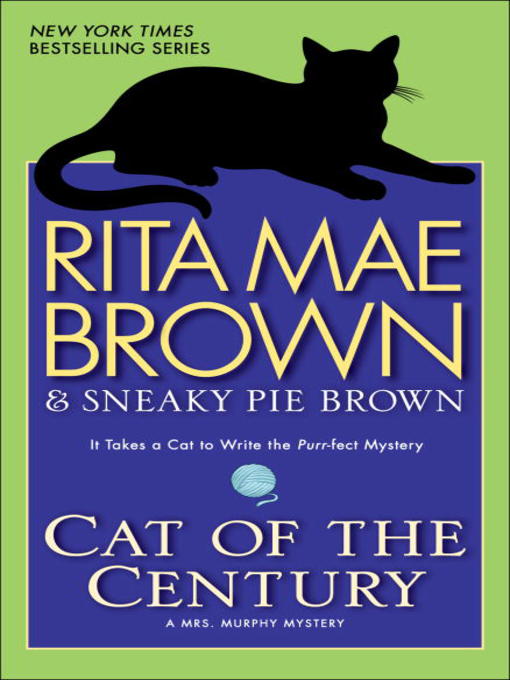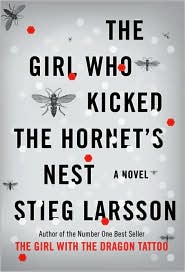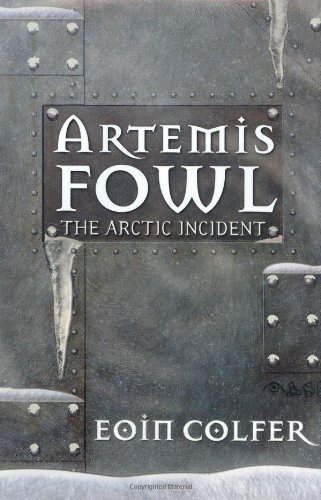Fifth in the Inspector Gamache series by Louis Penny, we find ourselves once again in Three Pines. This is a series that really must be taken in order to fully understand the dynamics between the characters--between husband and wife Peter and Clara Morrow for example. The Hadley house again plays a role in the murder--almost as another character--although this time brought back to life by yet another family that has fallen for the seemingly idyllic village. I have to say that the book, although still loving portrayal the characters and setting, is a bit of a disappointment and even a heartbreaker in the end. We don't really get much interaction with Armand Gamache except in his role as head of the homicide division. And a character who has been a benign and endearing presence in previous Three Pines mysteries turns out to have a dark side that even his partner and lover did not know about. So many hearts are broken--those who love this character in the story as well as those who have fallen in love as readers. We are launched into another investigation of the emotions that corrode in the dark and turn to murderous action when a body turns up in Olivier and Gabri's bistro. The new family in town--the Gilbert's--have poured money into the Hadley house in preparation for turning it into a high end restaurant, inn and spa. Perhaps they would take customers away from the bistro and B and B run by Gabri and Olivier, and perhaps not. But the enmity between the two sets of proprietors has developed and they are currently not on speaking terms. Clara meanwhile has been "discovered" by Denis Fortin, notable art dealer, and is scheduled for her own show. But during the negotiations, Denis insults Gabri and Clara is torn about whether or not to stand up for her friend and potentially damage her relationship with Fortin in the process. Husband Peter's advice, as always, is suspect due to his fear of being eclipsed in reputation by his wife's art. Gamache listens intently and follows where the clues and his understanding of human nature take him, even though we are reluctant to follow. Worthwhile as always and I am no less keen to pursue the next in the series, but a little sadder, nevertheless. Three Pines will never be the same.
Keeping track of what I read by jotting down my reactions, providing information about the author, and linking to additional reviews. And occasional notes on other book related things...
Sunday, December 26, 2010
Thursday, November 18, 2010
Cat of the Century
I was so infatuated with this series by Rita Mae Brown and Sneaky Pie Brown (her cat) when it first rolled out that I bought them all. I drifted away but when I saw her newest episode among the new audiobooks at the library, I grabbed it. What a disappointment. The polemics of her politics just weighed this down and overshadowed the thin thread of plot. Whether they were positions with which I agreed (humans are making a mess of the environment) or disagreed (all government and especially taxes are BAD), they were repeated so often and so pedantically--with no specific support for claims--that they just grew wearisome and eventually annoying. I am all for using literature to engage people through alternative and less threatening means in thinking deeply and sometimes differently about controversial issues. Carl Hiaasen's books for young adults that deal with ecological issues come to mind as good examples. But Brown has failed, both through her tone and her overly simplistic presentation of the issues. That being said, this book, like many of her other works, is a heartfelt and loving portrayal of her part of the country (Virginia) and offers an interesting cast of characters. Her early book, Six of One, is still in my top 10 list because it is so funny.
Saturday, October 23, 2010
The Cruelest Month
If you can get past the unlikelihood of three murders occurring in such a tiny Canadian village in as many years, this third Inspector Gamache installment in the Three Pines series by Louise Penny is most satisfying. Gamache and his team are called in to solve a bizarre death --as with the two earlier mysteries, this one is connected with the old Hadley House which overlooks the village. It has fallen into disrepair after the murder of the last owner, and as Easter approaches, the villagers decide to try and exorcise the evil spirits of the place through a seance. Except that one of the seance participants is apparently frightened to death--literally . Or perhaps someone helped her along. The subplot about a colleague at the Surete maneuvering behind the scenes to fully and finally discredit Gamache is brought to a head as slanderous stories about Gamache's family appear in the press. The provocative Agent Nichol remains for almost the entire book a question mark, although Lemieux reveals his true colors early on. The real traitor, who Gamache had called a friend all his life, realizes too late that his jealousy has destroyed one of the few things that ever brought him happiness, his friendship with Gamache. Throughout, Gamache remains a truly human being with fears and failings, but with his integrity and compassion always intact. Would that we could all grow up to be as kind, as steady, as insightful as this man.
Monday, October 11, 2010
A diversion--Tell No One
Not sure who turned me on to this movie, and I don't usually talk about movies here, but this one was so good that I can't resist. I recognized Kristin Scott Thomas as a co-star, but given that it's a French film (with sub-titles) it's no surprise that my pedestrian experience does not include having seen the lead (Francois Cluzet) or knowing the director (Guillame Canet). It was suspenseful, action filled and tightly plotted. The cinematography was great. A physician whose wife was murdered 8 years ago has come under renewed suspicion from the police when two dead bodies are discovered on land near the old crime scene. Even though it seemed he couldn't and wouldn't have killed his wife, certain facts of the crime just don't add up. And now too many facts are starting to point to him as the killer of not only his wife, but the two dead bodies and a new murder where the evidence is found in his apartment. Altogether too tidy for at least one policeman's taste. The parallel story is that the doctor has received a video via e-mail showing his wife alive and well and 8 years olders accompanied by the admonistion, "tell no one, they are watching." Riveting and absolutely recommended.
Friday, September 24, 2010
The Mapping of Love and Death
This is the 7th in the Maisie Dobbs series, and I admit I have not read all the intervening ones--in fact I may have missed about 3 or 4 of them. That did not detract from my enjoyment of this audiobook, however, although I did get some surprises. In this installment, Maisie is well-established in her private investigator cum psychologist consulting practice. She is contacted by an elderly American couple who have recently learned that their son, who was MIA in The Great War, has been found, buried in a farmer's field. The remains of Michael Clifton and several of his fellow soldiers have been uncovered in a collapsed dugout. Although Michael was American by birth, his father was British and so, when the war starts, he heads for England to serve. Because he is a trained cartographer and surveyor, his skills are sorely needed and he is accepted into the British forces. His parents have also received a packet of letters that was on the body, apparently from a woman he was involved with, and they want Maisie to find her. They have come to Maisie at the recommendation of an American doctor with whom she worked during the war. Both Dr. Hayden and Maisie recognize from the post-mortem report, that something is amiss; for it appears Michael Clifton was bashed over the head--murdered--before the dugout was bombed. As with so many of her books, the plot is complicated but well-drawn, the creation of characters, place and time is faultless. It appears that someone does not want this mystery investigated, for the Cliftons are subsequently attacked in their hotel room and left for dead, and Maisie herself is attacked and her document case is stolen. Trusty associate, Billie, and Maisie both must deal with significant challenges in their personal lives as well. If you are a Maisie Dobbs fan, you won't want to miss this. If you're not a fan, get started with the first book so you'll become one.
Committed
I didn't even read Elizabeth Gilbert's book before I went to see the movie version, Eat, Pray, Love. I'm pretty sure every woman I know--at least all the ones I talked to--HAD read the book. But based on rave reviews of that book by friends, and a favorable impression of the movie, when my friend Marianne offered to loan me the follow up to that story in audiobook form, I took it. It is basically about Gilbert's year long quest to learn everything she could about marriage in order to come to terms with the situation faced by her and her partner, Felipe. For reasons unknown, Homeland Security decided at some point in their commuter relationship that Felipe could no longer come to the United States. Didn't matter that he was an Australian citizen, that he had done business in the United States for years. He simply couldn't return. And they found this out while on the way home to Philadelphia when he was detained and questioned for several hours, then imprisoned until he could be flown out of the country. The only option was for them to marry, but neither of them really wanted to, due to bad divorces from their first spouses, and it wasn't all that easy to get permission. So in the intervening months, while an immigration lawyer worked on the beaurocratic hurdles, they tried to live as cheaply as possible in southeast Asia, eventually returning to Felipe's previous home in Bali. But in the meantime, Gilbert engaged in an unrelenting research project, reading everything she could get hands on and interviewing every person she came across. And we learn what she learns. I was reminded at times of starting to read Karen Armstrong's A History of God. I realized afresh, in connection with this specific social institution, that what we know today, what people tell us has been the history of marriage, is but a small fraction of it's overall role in the course of human civilization. The reasons people marry have changed, who gets to decide who gets married has changed, even whether or not marriage is a good thing has changed. Contrary to popular religious rhetoric, the Christian churches originally sought to stop all marriage--and of course sexual behavior. The pace of the book ebbs and flows, and occasionally her dithering gets a bit tedious, but I learned so much at an intellectual level, and resonated so often at a personal level, that I wouldn't hesitate to recommend Committed. She writes wonderfully and that in and of itself is a treat.
Sunday, September 12, 2010
Blameless
A Fatal Grace
I am so well and truly hooked on this series by Louise Penny that, having finished this, the second installment of the Inspector Gamache// Three Pines mysteries, I feel like an addict in withdrawal . A little over a year has passed since Inspector Gamache came at Thanksgiving to solve a murder whose necessary ingredients had been simmering for decades. Now, at Christmastime, with the cold descending into killing sub-zero temperatures, repressed fury once again boils over in an incredibly complex and planful murder of the newest resident of Three Pines, CC de Poitiers. Everyone hated her, so the cast of initial suspects is large--her husband and daughter, her lover, the entire town. As usual, it all comes down to motive. CC is killed in plain view, at a curling match, by grabbing hold of an electrified lawn chair, sitting in a puddle of water on a frozen lake, without her gloves on--when it is freezing outside. No small feat, you will admit, to make that happen.
Intriguingly, the death of a homeless woman in Montreal may be intimately tied to this one, and serve to reveal who the murderer is. Three characters who played minimal roles in the first novel emerge as key witnesses here: Emilie, Beatrice, and Kaye. Along with the dead woman in Montreal, Elle, they all have names that can be reduced to letters: M, B, K and L. What a busy mind our author has. Like a snake curled around the base of the toilet, waiting to bite you in the butt, there is another line of trouble coiling around Gamache's life. The Arnot affair, mentioned only briefly in the previous book, is coming back to threaten him, although we do not find out exactly how that will happen in this book. We are surprised, in the end, at who is plotting against our dear Inspector. For he is irresistible, this thoughtful, compassionate, and highly ethical individual, who loves his wife and seems to consider himself a lucky and contented man. He cannot compromise for the sake of politics, however, and powerful forces hold this against him. Fortunately for me, there are more books in the series already out there, just waiting for me to get my next fix.
I don't entirely understand why, in this particular case, they needed to change the original title in England, Dead Cold, to A Fatal Grace. But under either title, you will be bound to fall in love with Three Pines, its inhabitants, and Inspector Gamache once you start reading.
Intriguingly, the death of a homeless woman in Montreal may be intimately tied to this one, and serve to reveal who the murderer is. Three characters who played minimal roles in the first novel emerge as key witnesses here: Emilie, Beatrice, and Kaye. Along with the dead woman in Montreal, Elle, they all have names that can be reduced to letters: M, B, K and L. What a busy mind our author has. Like a snake curled around the base of the toilet, waiting to bite you in the butt, there is another line of trouble coiling around Gamache's life. The Arnot affair, mentioned only briefly in the previous book, is coming back to threaten him, although we do not find out exactly how that will happen in this book. We are surprised, in the end, at who is plotting against our dear Inspector. For he is irresistible, this thoughtful, compassionate, and highly ethical individual, who loves his wife and seems to consider himself a lucky and contented man. He cannot compromise for the sake of politics, however, and powerful forces hold this against him. Fortunately for me, there are more books in the series already out there, just waiting for me to get my next fix.
I don't entirely understand why, in this particular case, they needed to change the original title in England, Dead Cold, to A Fatal Grace. But under either title, you will be bound to fall in love with Three Pines, its inhabitants, and Inspector Gamache once you start reading.
Saturday, September 4, 2010
Patriot Acts
Not too hard to surmise from the title that this is a plot line where people who always thought they loved their country are challenged in that belief when their country appears to have turned on them. A later entry in the Atticus Kodiak series by Greg Rucka, Atticus has gone from being a reputable, competent bodyguard to being labelled as one of the ten most wanted assassins in the world, and the source of this misinformation seems to be someone very high up in the U.S. government. His partner and dear friend, Natalie Trent is killed in one of multiple attempts on his life, and so far his efforts to find out who is behind it all have fallen short. He has teamed up, romantically as well as professionally, with a former enemy, Drama, aka Alena Cizkova. They are alternately the hunted and the hunters, as they work to track down the master puppeteer, covering ground from a remote village in Russian Georgia to Portland, Oregon. In the process of their association, Alena has become more human, and Atticus has become a little more cold-blooded. Alena has taught him ballet and yoga as a way to master and control his body, and he needs every bit of this unorthodox training to survive what comes at him in this book.
Mystery Mile
Consumed a couple of audiobooks on my daily commute in the last 3 weeks. One, Death of a Celebrity, was another in M.C. Beaton's Hamish MacBeth series which I always enjoy. The other was by Marjorie Allingham, one of the British mystery dames I had heard a lot about but never actually connected with. Her protagonist, Albert Campion, is a complex and fairly bizarre character. His career is obviously one I have not been privy to follow as this book finds him well-ensconced in a flat above a police station, in the good regard of Scotland Yard, with a well-developed network of small-time and big-time criminal contacts. That all takes time to nurture. But his presentation is as a fop, for lack of a better word. He is frequently described as having a vacuous expression, engaging in the most meaningless and banal chatter, and yet underneath has a creative, calculating, and lightning fast mind that keeps him miles ahead of the really bad guys--at least most of the time. In this novel, he is hired to protect an American judge who appears to have evidence that would help identify the head of a major crime ring. Campion initially tries to hide him in the long-time home of a couple friends on a small isthmus in Suffolk, thinking that the small village is not only off the beaten path but also that villagers are likely to be acutely aware of any unwanted strangers in the vicinity. Nevertheless, it is only hours after their arrival that the first death takes place and plans must change. This is a satisfying mix: country cozy setting, a large cast of characters, some romance, and a fairly challenging plot. And of course very British. I'm not sure Allingham will replace PD James or Ngaio Marsh at the top of my list of British mystery writers, but I wouldn't mind meeting Mr. Campion again. There is a competent plot summary in Wikipedia.
Sunday, August 29, 2010
Still LIfe
Saturday, August 21, 2010
Changeless
This second installment in the "Parasol Protectorate" by Gail Carriger finds Alexia Tarabotti now firmly ensconced as Lady Maccon and Muhjuh to Queen Victoria. Something very strange is going on because all the supernaturals in a part of London have lost their powers. Vampires and werewolves are suddenly mortal and the ghosts they rely on for information have all been exorcised. This epidemic or weapon becomes the focus of Alexia's and her husband's investigations and takes them to Scotland, his former home. We learn about his former pack and why he left them, bereft of an alpha--a seemingly unforgivable act. We meet his great great great grandaughter who desperately wants to be converted and tries to enlist Alexia's help to convince Connall to do it. We also meet a mysterious female French scientist, Madame Lefoux, commissioned by Lord Maccon to create an extraordinary parasol for Alexia, who dresses like a man and seems quite attracted to Alexia. You really need to read the first book, Soulless, to have a good handle on this one, and you will be rewarded by greater depth of characterization and an engrossing storyline here. The wonderful cast of ancillary characters--Lord Akeldama, Miss Hisselpenny, Professor Lyall-- are all still present and accounted for. This book qualifies as steampunk with its infatuation with machanical, pseudo-scientific gizmos and machines. Alexia takes her first, and almost fatal, trip in a dirigible and learns to operate an aetherograph machine. There is a twist in the plot at the end that surprise and distress you--fortunately the sequel, Blameless, is already in the works.
Sizzling Sixteen
Nothing unpredictable in the newest Stephanie Plum episode and it's apparently pissing off a lot of series readers. Grandma Mazer is a little more subdued than usual in this episode and even the Joe - Stephanie and Ranger - Stephanie dynamics are a little in the background. I also wish she would just pick one of them and get on with it, but it doesn't happen here. Of course Stephanie messes up cars and ends up in totally ridiculous situations trying to retrieve FTA's. But this time the focus is on rescuing her boss, Vinnie, who has been a colorful but relatively unimportant character heretofore. Vinnie has been kidnapped by people to whom he is deeply in debt and they are threatening to kill him if Connie, Lula and Stephanie don't come up with a million plus dollars. So they set out to rob the bad guys in order to pay off the bad guys and hopefully not get caught at it. They depend on buckets of fried chicken to lure away guard alligators and Connie's tried and true stink bombs. Just the usual stuff in Trenton, New Jersey. Ranger's got her back the entire time so we never have to really worry...just go along for the ride and have a good time.
Monday, August 9, 2010
Lost Lake
This is one of Philip Margolin's twisty thrillers with a complicated set of characters and motivations, and a storyline that spins back and forth across several decades of time to weave a tapestry of conspiracy. A congressman is brutally murdered at his home in Lost Lake, California and his congressional aide and houseguest, Vanessa Kohler, walks in on the scene. She recognizes an old high school friend, Carl Rice, as the slayer and runs screaming from the house. Rice disappears--only to resurface more than two decades later in Portland, Oregon, under a different name, as an off-the-grid itinerant fine furniture maker. Single mom and new attorney, Amy Vergano, is impressed with his mild manner and quality work at a craft fair where they share neighboring booths, and she volunteers to rent a garage apartment to him when he mentions needing a place to stay. He becomes a positive role model in her son's life and so Amy is shocked when an argument at a little league game turns violent and nearly deadly because of this same man. Meanwhile back in Washington, DC, the news coverage alerts Vanessa that the man she thought long dead is still alive, and may be her only key to proving that her father, General Wingate, ran a clandestine and illegal team of assassins during the Vietnam war and afterwards. He is now a candidate for President and she has written a book warning people of his past activities. However, no one really believes Vanessa's stories, and no publisher will accept the manuscript, because word is out that she was confined to a mental institution after witnessing the murder, and that now she works as a tabloid reporter. She heads to Oregon to try and talk to Carl and to ask Amy to defend him in the upcoming trial. More people die, and certainly Carl has killed in his past, but everyone is being manipulated into believing something other than the truth.
Girl who Kicked the Hornets Nest
Stieg Larsson does not let us down in this third installment featuring Lisbeth Salander and Mikael Blomkvist. In fact, he spares us the usual red herrings that characterized the first two books and keeps everything relentlessly focused on the powerful machinations to sweep Zalachenko and his inconvenient daughter under the rug. That's not to say that there aren't subplots a plenty, e.g., Erika Berger's move to head a major newspaper initiates a series of stalker episodes, and Salander's half-brother is also the object of a police manhunt and far from being out of the picture. But the storyline around Erika results in a truce with Salander and makes Berger a much more three dimensional character than previously. Mikael stubbornly and resourcefully continues to probe the extensive and deadly cover-up that now has Lisbeth at its center. With his help, and the help of other allies (Palmgren, Armansky), Salander once again uses her unique talents to topple those who would abuse power at the expense of the seemingly powerless. The lingering question is, what will Salander do with herself when she no longer has to spend all her time fighting to survive...
Saturday, August 7, 2010
Dark Tort
I think I have outgrown Diane Mott Davidson. Her books are like the comfort food protagonist, caterer Goldy Bear Schultz, makes in each episode of the series. She has a likable family at the center of this series--Sheriff's Dept investigator and husband Tom, son Arch, catering whiz and partner Julian, and a new half-brother to Arch-- with a trusty best friend Marla. She always does a decent job of creating her Aspen Meadows setting near Boulder, Colorado, and Goldie always solves the crime ahead of the officials who don't have her penchant for poking her nose in where it could get her in trouble. One evening as Goldie goes into a local law firm to help prepare foods for an early morning breakfast for clients, she trips over the body of the firm's paralegal and Goldy's neighbor, Dusty Routt. Distraught at losing her young friend, Goldy is asked by the girl's mother to find out who did it. She claims the law firm where Dusty worked was a "nest of vipers." The story also involves a recently deceased chef and painter whose wild success as an artist barely preceded his diagnosis with pancreatic cancer. But his demise is from what is assumed to be an accidental fall. Another apparently random death gets pulled into the mix before this is all over. If you like mysteries with tasty recipe thrown in, this is for you. They just move a little too slow--without enough compensation in character or setting, etc.--to make these worthwhile for me anymore. Of course I have read at least half a dozen so take my grumping with a grain of salt.
Artemis Fowl: The Arctic Incident
Death of a Maid
My dear great aunt in Caldwell was kind enough to let us borrow some audio books on her account for the drive to Bend and then on home to LV. I love listening to the Hamish Macbeth books by M.C. Beaton because the readers have such wonderful accents. This one had a good plot dealing with, not surprisingly, a cleaning woman--Mrs. Gillespie-- who nobody liked but kept employing nevertheless, until someone hit her over the head with her own mop bucket. Her husband was joyous and immediately went into remission from his cancer. Her daughter was reunited with a husband after a divorce which her mother had precipitated. Hamish is pursuing leads and hunches, joined occasionally by former flame Elspeth who has come home for a visit. At the same time he is trying to avoid anyone figuring out that he is the one making progress, because to be noticed means potentially to be promoted, which would mean leaving his beloved Lochdubh. The suspects are thick on the ground for it turns out that not only was she an unpleasant woman, but she was also a nosy person who used what she found to blackmail her clients. Hamish remains resolutely a bachelor even though at one point he goes out and buys Elspeth an engagement ring. Poor Elspeth, having despaired of Hamish ever asking, accepts a marriage proposal from a fellow reporter who jilts her at the altar. Hamish's cat and dog, Lugs and Sonsie play a central role in Hamish's life and always add a quirky element to the tales of this quirky anti-hero. There is a rather distracting side plot in this book, after the main murder is solved, involving a crime lord trying to have Hamish killed. Of course Hamish turns this to advantage, too, capturing the criminal and several of his henchmen--but giving the credit to another inspector from Inverness. A fun listen/read as are all the books inthis series.
Wednesday, August 4, 2010
Undone
I've not followed Karin Slaughter's work though her name comes up often in the realm of police procedurals/crime fiction and she has a lot of fans. The characters of Undone are quirky and interesting: two agents with the Georgia Bureau of Investigation, Will and Faith, both come from bad childhoods. Will is dyslexic and Sara had a kid while still a kid herself. They apparently appeared in a number of her other books (e.g., Fractured). In this one, Faith passes out inexplicably and is taken to the hospital where we encounter another character from a different Slaughter book (Faithless), the on call emergency doctor Sara Linton. Sara is a widow; her dead husband was a cop, and she is damaged goods. In fact, they all are, but more endearing for all of that. Faith, it turns out, is pregnant and going into full-blown diabetes and she's having a hard time with both diagnoses. The three are brought back together when a horribly tortured woman is brought into the emergency room and it starts to look like she's only one in a string of victims. Personally, I had a hard time with all the grisly details of the torture, although told from a forensic perspective rather than from the serial killer's, they were off-putting. Enter with caution.
Two by Harlan Coben
Coben is a solid mystery writer with tricky plots and a regular cast of characters that reappear in many of his books. So it felt like a lucky find to run across one of his paperbacks in the trading library at the resort on Crete. The Woods revolves around a cold case involving 4 teenagers who disappeared into the area surrounding a co-ed summer camp and presumably all died. Except two of them were never found. One of the missing ones was the sister of our protagonist, Paul Copeland, who also happens to be the county prosecutor in Essex County, NJ . Old memories are stirred up when a murdered man with Paul's card in his pockets, is tentatively identified by Paul as the other missing teen from that night long ago. Does that mean his sister could also be alive? And did we mention that Paul had been one of the counselors in charge at the camp the night the murders and disappearances took place, and that he hasn't seen or heard from the girl he sneaked off with that night in all these years, until now?
Long Lost is one I listened to on our travels to and from Bend a couple weeks ago. Myron Bolitar, sports agent (and a regular fixture of many Coben novels) gets a 5 am wake-up call from a long-lost love, Teresa Collins, inviting him to Paris for a few fun filled days, “'Think about it,” she went on. “The City of Lights. We could make love all night long'...What’s wrong, Terese?'... 'Nothing’s wrong. I want to spend a romantic, sensual, fantasy-filled weekend with you in Paris.'Another swallow. 'I haven’t heard from you in, what, seven years?" But indeed something is very wrong. Her husband is missing and eventually turns up--dead. Events start to make it look like the daughter she thought died years ago in a car wreck might not be dead. But it's oh so much more complicated than this. It's all about a plot to grow terrorists who can go anywhere because they look just like...well, read it and find out.
”
The King Must Die
An oldie but goodie by Mary Renault and another gift from my sis-in-law in honor of our Greece trip. It does give you a whole other perspective on viewing ruins that are thousands of years old to think of people actually living, loving, working in those places. For those of you not familiar, this is Renault's version of the Theseus legend. Was he the son of the god Poseidon? or of mortal king Aigeus and priestess Aithra. The story goes that Theseus was sent to Crete as part of Athens tribute--usually 7 girls and 7 boys--which was paid to avoid having Crete attack them. The youths were sent to the "Bull Court" where they "danced" with the bulls and usually didn't live very long, although they often lived well. The frescoes recovered from Knossos show the bull dancers. In the legend, Theseus manages to navigate the labyrinth and defeat the minotaur--half man, half bull--and sail home. But he forgets to change the colors of his sails to white. When his father the king spies the returning ships with dark sails, he despairs at his lost son and throws himself down the cliff to his death. In Renault's version, Theseus has already become a king in his own right by the time he volunteers to become part of Athen's tribute. He finds the Cretans have fallen away from the gods and become bored and irreverent, hence their eventual demise is inevitable. Knossos, once a city of 100,000 people according to historians, was in fact wiped out, perhaps by a tidal wave resulting from a cataclysmic volcanic explosion on Thera, followed by invasion by the Myceneans. There is no agreed upon explanation for the decline of a robust civilization that lasted for over 1600 years.
Thursday, July 22, 2010
The Skull Mantra
 My lovely sis-in-law had recommended this book and it was well worth the read. Written by Eliot Pattison, the story is set in Tibet after the Communists took over, a fairly uncommon setting for a mystery. We are introduced to the prisoners of a labor camp, mostly monks and other dissidents, but also a few Chinese communists who just didn't have the right brand of politics. Former inspector Shan Tao Yun apparently made the mistake of going after one too many corrupt officials and is now building roads under the worst physical conditions--cold, hunger, occasional torture, and ongoing physical and psychological brutality by the guards. But then the laborers discover the headless body of a well-dressed Chinese who turns out to be a high ranking official, and now the former inspector is brought out of forced retirement to unofficially investigate and write a quick report that will leave local officials in the clear. Much of the detail involves the practitioners and beliefs of Buddhism which make for fascinating reading--and apparently there are several more books in this series once you're hooked as I was.
My lovely sis-in-law had recommended this book and it was well worth the read. Written by Eliot Pattison, the story is set in Tibet after the Communists took over, a fairly uncommon setting for a mystery. We are introduced to the prisoners of a labor camp, mostly monks and other dissidents, but also a few Chinese communists who just didn't have the right brand of politics. Former inspector Shan Tao Yun apparently made the mistake of going after one too many corrupt officials and is now building roads under the worst physical conditions--cold, hunger, occasional torture, and ongoing physical and psychological brutality by the guards. But then the laborers discover the headless body of a well-dressed Chinese who turns out to be a high ranking official, and now the former inspector is brought out of forced retirement to unofficially investigate and write a quick report that will leave local officials in the clear. Much of the detail involves the practitioners and beliefs of Buddhism which make for fascinating reading--and apparently there are several more books in this series once you're hooked as I was.
A Venetian Reckoning/ Death and Judgement
Along with all the wonderful historical info and daily activity notes lost with my travel journal was a record of my vacation reading...but will do my best to reconstruct at least some of them. This book was found in the hand-me-down library at the last place we stayed on Crete and it turned out to be quite a treat. Apparently the 4th installment of a series by Donna Leon about police Commissario Guido Brunetti, it was originally published under the title Death and Judgement. The basic plot line involves investigating the murders of several highly prominent businessmen, who turn out to have a decidedly dark side to their business dealings--trafficking in prostitutes and worse. The story line is intriguing, the characterization of the protagonist and his family are engaging and the description of the city (Venice) is yummy snacking for armchair travellers.
Monday, June 7, 2010
Charlie M
Brian Freemantle has written a whole series of books about Charlie Muffin,
who really dislikes being called Charles. I'd never heard of them, and
can't honestly remember now how I found out about the series, but it
sounded like he'd found a winning formula so thought I'd check it out by
reading the first one. Set during the Cold War, Charlie is a
spy--a leftover from a previous regime that apparently had some
embarrassing events which resulted in a new Director and a wholesale
housecleaning of the staff. Charlie cultivates a rumpled, even shabby
appearance, but is still the most knowledgable agent they have. His
ruthlessly ambitious and probably sociopathic new boss, Cuthbertson,
sets Charlie up to get captured while crossing from East Berlin.
Charlie, ever a survivor, outwits the treachery, although a man Charlie
was trying to help escape to the West gets killed in his place. His new boss also attempts to diminish the importance of Charlie's recent capture of a major Russian spymaster operating in Great Britain, but this backfires, so Cuthbertson is forced to keep Charlie on staff. He does manage to shove Charlie into a former broom closet of an office and is threatening a demotion. Now a major player in the KGB is making noises about defecting, and after Cuthbertson's still wet-behind-the-ears agents get killed or captured, Charlie is brought in to save the play. I was caught totally unawares by the plot twist in this first novel of the series and I'm definitely curious to see where things go from here.
Friday, June 4, 2010
The Prince of Mist
When Max and Alicia’s father decides they must move from the city to a small coastal town in England to be safer from the war (WWII), the family is less than excited. Thirteen year old Max, our narrator, is distraught at leaving behind friends and familiar places, and older sister Alicia withdraws even more into herself. The suspense begins the moment they arrive at the village train station when a large cat adopts their younger sister Irina and then seems to be keeping an eye on the family once they move into their new beach house. The house and grounds also seem to be watching and maneuvering family members in mysterious way. While exploring town, Max becomes acquainted with Roland, a young man who will be going off to war in the fall. Roland introduces Max to diving in the bay and shows him a wrecked ship, the Orpheus. Once Alicia and Roland meet, a tentative romance is begun, but events really begin to spin out of control when Irina is rushed to the hospital after an apparently accidental fall down the stairs. Alicia, Roland and Max all discover that they are being haunted by the same images of a malevolent clown—in their dreams, in a statue that seems to move in the overgrown garden, and even on some old family movies discovered in the garden shed. Roland’s adoptive grandfather, the self-appointed lighthouse keeper Victor Kray, reveals under pressure the story of his escape from the wrecked ship. Kray had been in pursuit of an evil man named Cain who was responsible for the death of a childhood friend, and originally believed Cain had died in the shipwreck, but now he’s not so sure. Cain, also known as the Prince of Mist, has come back to reclaim a promised prize, the firstborn child of the beach house’s former owner. Supposedly the child, Jacob, drowned when he was seven years old, but Max discovers from viewing the old films that Jacob is in fact Roland, who Kray has been attempting to hide and protect for over 10 years. This is a quick reading suspenseful story from beginning to end, with a believably brave young male narrator who will appeal to boy readers.
The Prince of Mist by Carlos Ruiz Zafon (Translated by Lucia Graves)
BIBLIO: 2010 (originally published in Spanish, 1992), Little. Brown and Company/Hachette Book Group. Ages 13 to18, $17.99.
Sunday, May 23, 2010
The Girl Who Played with Fire
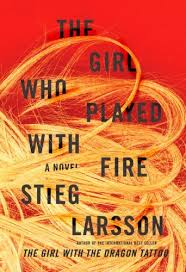
Perhaps even more compelling than the first book, or maybe more compelling because of the first book, Stieg Larsson's 2nd entry in the Millenium trilogy focuses largely on Lisbeth Salander who early on becomes the focus of a manhunt in a triple murder investigation. The complicated background that has created this socially phobic but uniquely brilliant character is revealed and boy is this a doozy of a twisty plot--imagine your most nightmarish conspiracy theory if you were the target. And then imagine you were just 12 years old when it all started. But if you liked the first book, you will love this one. Lisbeth eventually has some very powerful people on her side, which is amazing given how little she is able to offer in the way of normal personal relationships. Salander engineers several major changes in her life, and the book leaves us knowing there are more changes on the way for these characters .
Perhaps even more amazing than reading the book was finding out that the Swedish film version of Girl with the Dragon Tattoo was playing on the other side of town and we got to see it this weekend. The cast was absolutely superb and they didn't pull any punches on some of the more gut-wrenching scenes from the book. Of course no movie can ever develop the complexity of relationships and events that comprise a good novel, but they did an outstanding job of capturing the essence. They even corrected one of my minor gripes about the book--the disappearance from the storyline of the police detective originally assigned to the Harriet Vanger case. There is some foreshadowing of the 2nd novel in the movie, but you will want to see this if you possibly can no matter how many of the books in this trilogy you have or haven't read. Two members of our group knew nothing about the books and were still enthralled.
Thanks to my friend Wendy Starkweather for the lead to this lengthy article in the New York Time Magazine to a lengthy bio piece on Larsson and the controversy surrounding his literary heritage.
Sunday, April 25, 2010
Bangkok Haunts
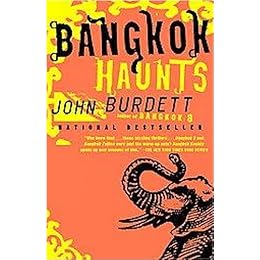
This time there is an even bigger dose of ghosts in John Burdett's 3rd Sonchai Jitpleecheep installment. One of Sonchai's former lovers has been murdered in a snuff film and someone thoughtfully sent him a copy of the film. His corrupt and greedy boss, Colonel Vikorn, can as usual only think of how to turn a profit and decides to expand his money making ventures into pornography. He instructs Sonchai to release from prison a man that Vikorn framed who is awaiting what could be a death sentence; he just happens to be a film maker and the deal offered is his freedom in exchange for making "classy" porno films. Sonchai's wife is very pregnant with the reincarnation of his former partner, and the ghost of the dead prostitute in the snuff film is regularly visiting Sonchai at night in a most physical way. Elephant games, a particularly gruesome form of murder, is planned for the masterminds behind the film by the ghost of the dead woman. As always, Burdett creates a compelling picture of Bangkok, the folly of farang tourists, the not very underworld of prostitution and corruption, all mixed with Jitplecheep's Buddhist beliefs. I can't say it makes me want to visit the country, but it certainly creates a vivid picture of life there. See earlier review of his other books: Bangkok 8, Bangkok Tattoo, and the non-series book, The Last Six Million Seconds.
Monday, April 19, 2010
Snow Crash

For starters, this is a great title for a book . I just happened upon the author, Neal Stephenson (there are links to interviews with him on his homepage), when someone left a book written by him in a hotel room. That book, Cryptonomicon, just grabbed me and didn't let go until several hundred pages later. I was gratified to learn, through an NPR piece, that it was among Nancy Pearl's favorite books in the sci-fi/fantasy genre (although clearly there are large doses of history wrapped up in there). Snow Crash is clearly set in a future world that doesn't sound all that pleasant; I'm reminded of the bleak picture of our future presented in Blade Runner (the movie based on Dick's novel: Do Androids Dream of Electric Sheep). Those who can afford it, escape to an elaborate virtual world, the Metaverse--something that wouldn't seem foreign to inhabitants of Second Life--all the more remarkable because this book was written almost 20 years ago. Hiro Protagonist (nice name :-) is a sometimes computer programmer, sometimes pizza delivery person, and sometimes information source for the CIA; he's adept with samurai swords. The US government is holed up in a compound. Megachurches and megacorporations are running the world. Hiro's sidekick is a 15-year old Kourier who delivers packages on her skateboard--don't even think you know about skateboards until you read about her model. They are trying to figure out who or what is behind the attack on one of the world's leading computer programmers, causing him become a gibbering idiot in a hospital after he watched black and white "snow" on a computer in the Metaverse. It's a wild ride in more ways than one and wildly creative, with just one serious flaw. There is a much too elaborated tie in to the ancient Sumerian language and various biblical and other mythology that just drags, sometimes for several pages. Normally, I like this kind of historical fiction reference, but I was lost and got annoyed. So you either need to really be into this particular brand of religious mythology or just skim over it like I did. It's definitely worth reading. There's a lengthy and excellent overview of the story line at the Complete Review.
Tuesday, April 6, 2010
Mugwump and Bookbags
NOT a book review...
My friend Mary Caughey gave me a wonderful little purse made from the covers of an old children's book and I get compliments on it every time I carry it. It's from a company called Mugwump which recycles books, board games, old maps, etc. to make useful everyday items. Today I ran across another company, Bookbags, that also makes purses and totes using the covers of discarded books. Very fun and very ecological.
Monday, April 5, 2010
Girl with the Dragon Tattoo
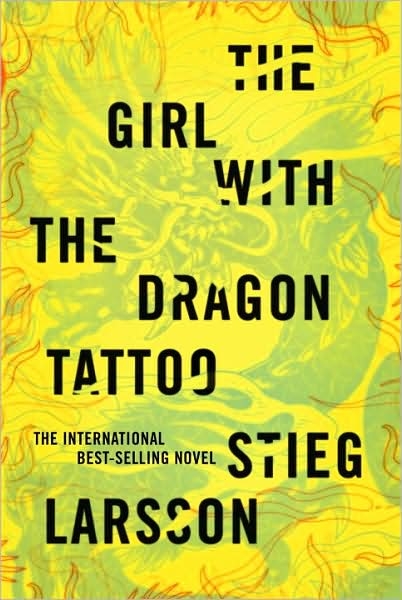
It was my friend Bob Nye's recommendation that finally pushed me into reading this book by Stieg Larsson...not that it took much of a push. I tend to like Scandinavian mysteries (see my post for What Never Happens) and this was really satisfying in some ways and disappointing in others. After the 2nd chapter, I was hooked, couldn't put the book down and went on a book reading binge for about 6 hours til I finished. The characters are compelling and I'm discovering that I need to really care what happens to the characters in order to like a book these days. Through no fault of his own, investigative financial reporter and magazine publisher Mikael Blomkvist has just lost a libel case in court and decides that leaving his magazine's editorial board is the best strategy to get the target of his investigation--corporate mogul Hans-Erik Wennerstrom-- off the warpath. His co-owner, Erika Berger, feels abandoned, and Wennerstrom hasn't given up trying to destroy the magazine by a long shot. Blomkvist is at loose ends, facing a stiff fine and several months jail time, so he's ripe to be plucked by another major Swedish industrialist for a personal project. Henrik Vanger wants Mikael to write his family's history as a cover story and find out who murdered his niece four decades ago. Harriet Vanger disappeared off an isolated island during a company/family conclave and Henrik is sure one of his family members killed her. The Vanger family turns out to have a whole host of unpleasant personalities and dark secrets. The other well developed character in the mix is a computer hacking genius and social misfit named Lisbeth Solander who does investigative work for a security agency through some fairly unorthodox means. She eventually get roped into the investigation of the missing Harriet, also. Which brings up one of my bitches about the book--Solander was badly treated in the end by Larsson and it's unforgivable given the shitty life she's had. Not that she isn't perfectly capable of looking after herself, but ...well you'll see when you read the book. And you must read the book. There are some provocative issues raised about personal responsibility--and the behaviors that test this principle range from the unethical to the horrific. Another pet peeves is that a character is introduced at the beginning of the book, the police investigator of the niece's disappearance, and then himself disappears from the remainder of the story, even when he could logically have been brought back in. There are also some characters whose motivations simply go unexplained and feel incomplete, like Cecelia Vanger. Overall though, I'm hooked and will round up the remaining books published posthumously, The Girl Who Played with Fire and The Girl Who Kicked the Hornet's Nest.
Saturday, March 27, 2010
The Ask and the Answer

Perhaps it should be called The Great Questions. This is the second installment in a planned science fiction trilogy titled "Chaos Walking" ( how could I resist?) from Patrick Ness. I ran across this one on a sale cart and, even though I hadn't read the first book in the series, picked it up just because it got so much chatter on the YA listservs. Complex characters, plots and interactions between characters are mixed in with non-stop action on this outpost of human exploration called New World. The native species, the Spackle, have apparently been defeated in a brutal war and now civil war among the settlers has broken out with one man--Mayor Prentiss-- apparently stopping at nothing to become leader. He recognizes the potential threat from the anticipated arrival of new ships with additional settlers, and so it is essential that he get information from Viola, who was the lone survivor of a scout ship that crashed. She has been befriended by Todd, and they are on the run, when Viola is shot and they desperately seek help in the town of New Haven. That's what I was able to surmise about the first installment, The Knife of Never Letting Go. This book takes up as they are captured in New Haven which has already surrendered to the invading army. Todd and Viola are separated and skillfully--and horribly--manipulated by two strong leaders, Prentiss and Mistress Coyle, a former leader of the resistance (aka the Answer)and also a healer by training. The moral issues are complex and one despairs of anything coming right as we alternately take our place in the action from first Todd's and then Viola's perspective. This is one where I would definitely recommend reading the first book before jumping into the second. Although it was a compelling read, you can't help but feel that you've missed a lot. But get busy because the next book is coming out this spring!
Subscribe to:
Posts (Atom)

